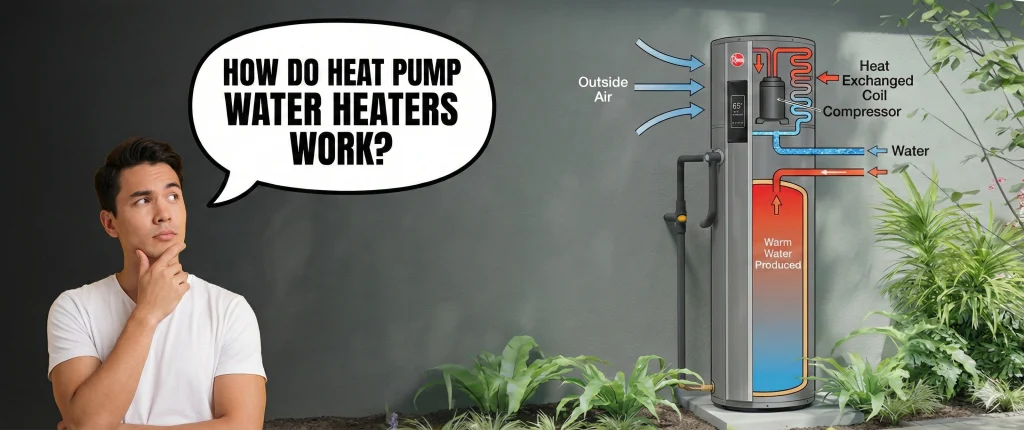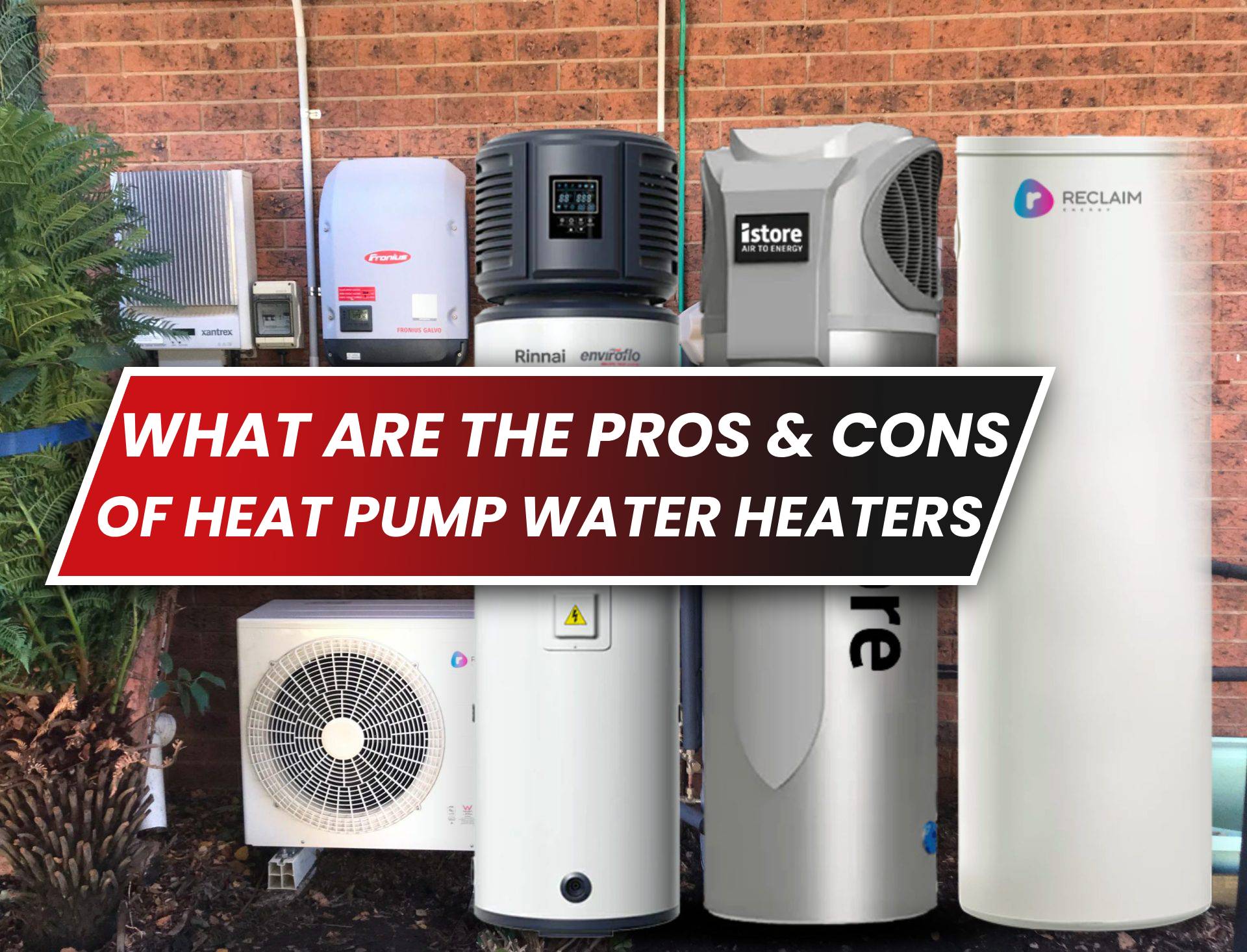
Ever wondered how you can heat your water using the air around you? It might sound like magic, but it’s […]

A heat pump water heater is an efficient alternative to traditional electric or gas water heaters.
It transfers heat from the surrounding air into the water tank using a vapour-compression cycle, like a refrigerator or air conditioner. This makes it much more energy efficient than conventional water heaters.
There are several advantages to using a heat pump water heater over conventional models:
The main advantage of heat pump water heaters is their superior energy efficiency. They can be 2-3 times more efficient than traditional electric resistance water heaters and can have a COP (coefficient of performance) of 2-3.
This means they provide 2-3 units of heated water for every unit of electricity used to power them. This translates into much lower monthly electricity bills.
For example, a family replacing an older 50-gallon electric unit that consumes 4500 kWh per year with a new heat pump water heater consuming just 1500 kWh annually could save over $300 per year on bills (at an electricity rate of $0.12 per kWh).
Because heat pump water heaters use less energy overall, they also result in lower greenhouse gas emissions from power plants compared to conventional water heating methods.
Some energy companies estimate that a heat pump water heater can reduce carbon emissions by over 2 tons annually. This significantly smaller carbon footprint makes them a more eco-friendly option for those concerned about their environmental impact.
While heat pump water heaters have higher upfront costs, homeowners recoup the difference over time through lower energy bills.
In many areas around the country, rebates and tax credits are available to help offset that initial investment in an energy-efficient appliance. Between grants and cumulative savings, what starts off as a big upfront cost can pay for itself in just a few years of operation.
The sealed system and lack of a flame or pilot light mean heat pump water heaters can last longer than traditional electric and gas models, which have mechanical parts that wear out over time.
Top brands offer 10-year or longer warranties on compressor parts, meaning fewer repairs and a longer overall usable lifespan. Plus, with energy savings, an upgrade can basically pay for itself well within that period.
However, there are also some downsides to consider with heat pump water heaters:
The steep initial investment cost of a heat pump system is the most prohibitive disadvantage for most households.
According to 2021 data, an adequately sized heat pump hot water system will cost between $2,000 and $5,500 to purchase and install. This is significantly higher than gas and electric storage systems, which can be under $1,000.
It could take many years to recover the upfront costs through energy savings, especially if installed as a retrofit, where solar PV synergies are absent. This makes heat pumps out of reach for lower-income households.
Heat pump water heaters are bigger than standard models.
They can be twice in height because the heat pump component sits atop the tank, requiring more clearance around the unit for proper ventilation. This added height and width may require creative modifications, especially in basements with low ceilings or small utility closets.
While they do heat water efficiently, heat pump water heaters usually only heat water to temperatures between 120-140°F versus 160°F for electric and 140°F for gas models.
This may mean less hot water capacity for tasks like dishwashing or showering with multiple taps open simultaneously.
Heat pump water heaters lose efficiency in extremely cold climates or seasons. They are optimally designed for climates where annual temperatures rarely fall below 40-45°F very often.
Inefficiency in Sub-Zero Temperatures
Heat pumps rely on extracting ambient heat from outdoor air to warm water, which means that in alpine areas that plunge below -5 °C regularly during winter, heat pump performance coefficients can drop below 2.0, requiring expensive auxiliary electric heating to compensate.
By contrast, areas where winter lows rarely fall below 5°C can maintain year-round coefficients above 3.0. This makes very cold climates ill-suited for heat pump water savings.
Since heat pump water heaters extract heat from the ambient air, they require good airflow around the unit to maintain higher efficiencies and avoid shutting off due to a lack of heat transfer.
Nearby structures, foliage, fencing, or roof overhangs can heavily obstruct airflow, leading to lowered heat pump performance.
The unobstructed exterior wall space should allow good cross-flow airflow across the heat exchanger coils, in order to maintain efficiency. Otherwise, electricity savings are unlikely.
Proper installation is key, including ducting cold exhaust air outside. Lack of ventilation can cause the unit to start and stop frequently and trigger error codes.
The damp warmth inside a heat pump water tank can, if left untreated, breed dangerous Legionella bacteria, which cause potentially fatal Legionnaires’ disease by inhalation.
Australian standards help mitigate this issue by requesting periodic and complete water sterilisation by raising tank temperatures above 60°C. However, this relies on disciplined homeowners or plumbers to manually activate this pasteurisation cycle every 6 months.
Failure to do so or system errors during the process can still lead to a risk of Legionella outbreak. Different hot water systems have a lower Legionella risk.
Unlike virtually silent internal electric water heaters, external heat pump units produce a mild but constant humming or whirring noise during operation. For certain households, particularly apartment dwellers, this mechanical sound can be very irritating.
Positioning the pump on a concrete pad and installing sound barriers can dampen the sound, however it remains an issue, particularly for night-time operation, in case bedroom windows are nearby.
Heat pump units take up considerable exterior wall space and require better planning than compact internal water heaters hidden away in cupboards.
Their protrusive industrial profile, akin to air conditioners, makes them more visibly obtrusive, which particularly limits apartment applications.
Soundproof ventilation requirements also rule out smaller, narrow spaces as options for installation. The hardware footprint requires more planning and materials compared to electric alternatives that can be slipped and hidden in closets.
As you can see, heat pump water heaters have both positive and negative aspects. They offer superior energy efficiency and environmental benefits, but these must be balanced against higher initial costs and limitations in some situations.
Overall, heat pump water heaters can be an excellent option for many homeowners seeking to save money and energy over the long run, but you need to make sure they are suitable for you before splurging on one.